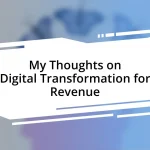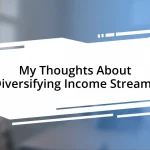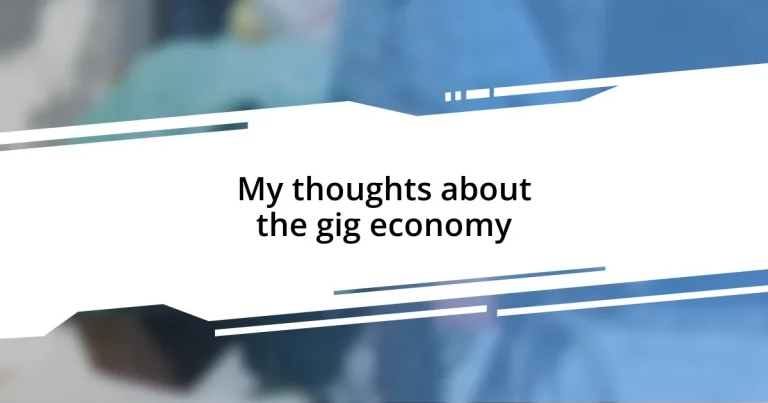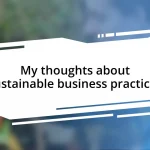Key takeaways:
- The gig economy offers flexibility and independence but comes with financial unpredictability and a lack of traditional employee benefits.
- Benefits of gig work include variety of opportunities, improved work-life balance, potential for higher earnings, skill enhancement, and networking possibilities.
- Challenges for gig workers include financial instability, lack of benefits, and feelings of isolation, necessitating community building.
- Future trends may include the rise of specialized platforms, hybrid work models, and advancements in technology enhancing gig worker visibility and marketability.
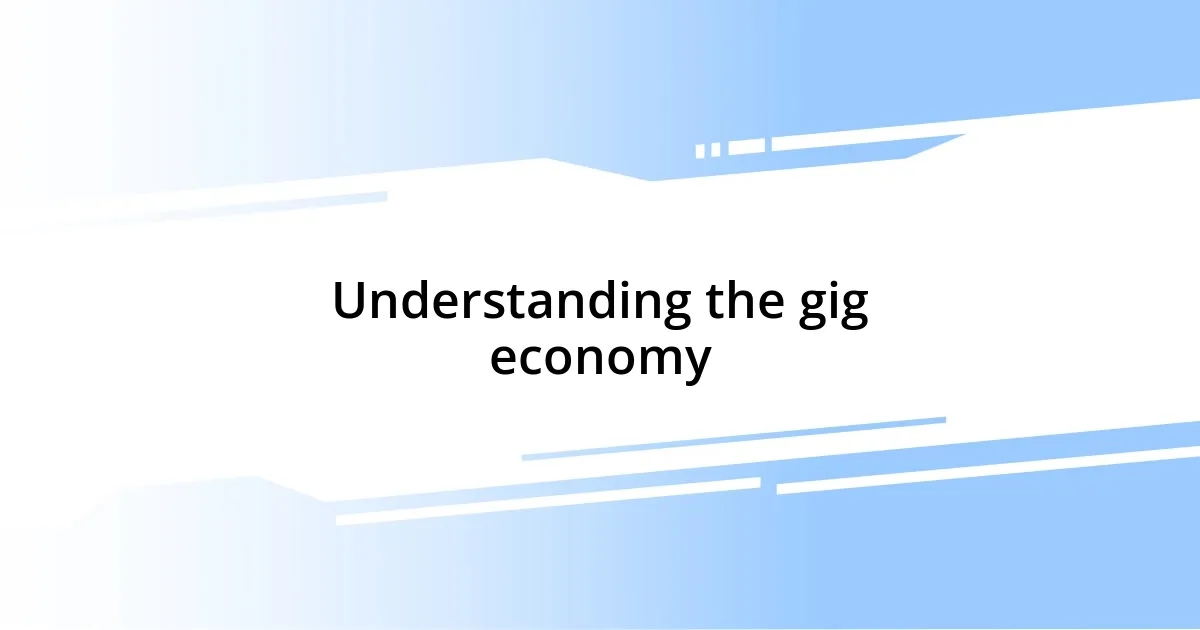
Understanding the gig economy
The gig economy can feel like a breath of fresh air, offering flexibility and independence that traditional jobs often lack. I remember the first time I took on a freelance project; it was exhilarating to set my own schedule and work from anywhere. But I also felt the pressure of unpredictability—will there be enough gigs next month for my rent?
In a world where we’re all connected digitally, the gig economy thrives on platforms that match skills with needs. I’ve seen friends jump from one task to another, eagerly embracing opportunities that play to their talents. Yet, amidst that excitement, I’ve also noticed the uncertainty it brings—how can anyone truly plan for the future when income ebbs and flows?
One of the most alluring aspects of the gig economy is its potential for side hustles. I’ve often pondered—why limit oneself to a single income stream? Diversifying through gigs can provide a safety net during economic downturns. But it raises an important question: how do we balance passion projects with the demands of daily life? Embracing gigs certainly offers freedom, but at what cost to our work-life harmony?
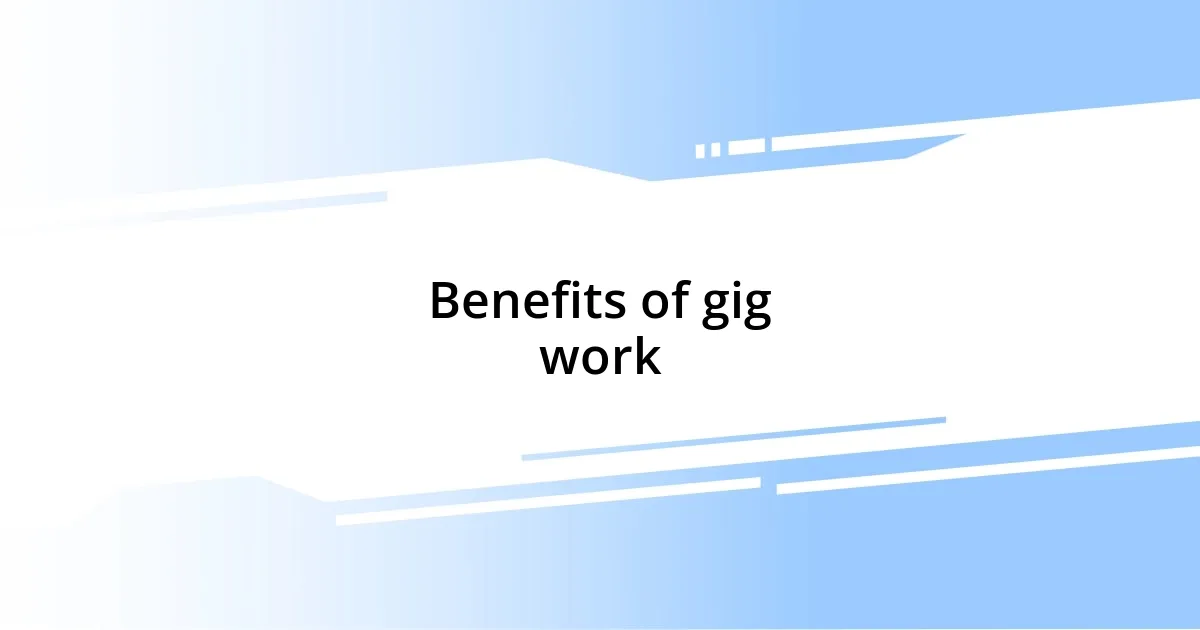
Benefits of gig work
One of the standout benefits of gig work is the flexibility it offers. I’ve had days where I could knock out a few hours of work in the morning and then spend the afternoon enjoying a coffee with friends or taking a much-needed walk in the park. This kind of schedule feels liberating, allowing me to tailor my work around my life instead of the other way around. When I think about traditional jobs, the rigid hours can feel constricting, like wearing shoes that are just a bit too tight.
Here are some benefits of gig work that I’ve personally experienced or observed:
- Variety of Opportunities: Gigs can span various fields, from writing to graphic design, allowing people to explore multiple interests.
- Improved Work-Life Balance: With the ability to choose when and where to work, it’s easier to manage personal commitments.
- Potential for Higher Earnings: By taking on multiple gigs simultaneously, there’s a chance to earn more than in a standard job—especially in high-demand sectors.
- Skill Enhancement: Each gig can serve as an opportunity to learn something new or refine existing skills, which is incredibly rewarding.
- Networking Possibilities: Working on diverse platforms often leads to meeting new people and expanding professional networks, which can open future doors.
I often feel energized by the prospect of learning from each gig, soaking in new experiences like a sponge. It transforms work from a chore into an adventure, fueling my passion for what I do while keeping things fresh and exciting.
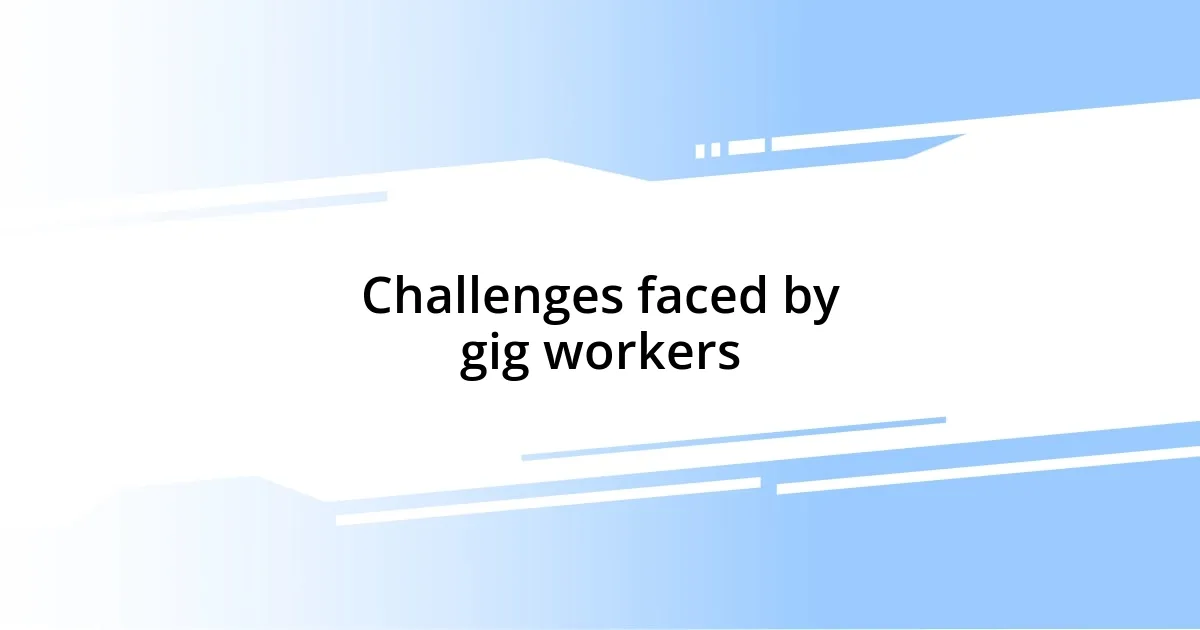
Challenges faced by gig workers
Gig workers face a myriad of challenges that can sometimes cast a shadow over the excitement of freelancing. One significant hurdle is the lack of financial stability. I recall a time when I worked on a project that promised a huge payout, but the client delayed payments for months, plunging me into a financial frenzy. That experience taught me just how unpredictable income can be in the gig economy and how it directly impacts planning for expenses and savings.
Moreover, gig workers often miss out on essential benefits that traditional employees enjoy, such as health insurance, paid leave, and retirement plans. I’ve seen friends struggle with health issues, not being able to afford insurance. It’s a tough position to be in, knowing that every day spent unwell translates to a loss of income with no safety net to fall back on. The weight of that pressure can be overwhelming and creates a constant sense of urgency to book the next gig.
Finally, the isolation that comes with gig work can be quite daunting. I’ve found myself working for hours on end, only to realize I hadn’t spoken to anyone in days. Building a network becomes crucial but can feel like an uphill battle when you’re always on the move. It’s essential to foster connections in this environment—not just for collaboration, but for emotional support as well. After all, navigating the gig economy is not just about finding work; it’s also about finding community.
| Challenges | Description |
|---|---|
| Financial Instability | Gig workers often face unpredictable income, making it challenging to budget and save for the future. |
| Lack of Benefits | Many gig workers do not receive benefits like health insurance or retirement plans, leading to potential financial strain during emergencies. |
| Isolation | The solitary nature of gig work can lead to feelings of loneliness, making it important for workers to seek out community connections. |
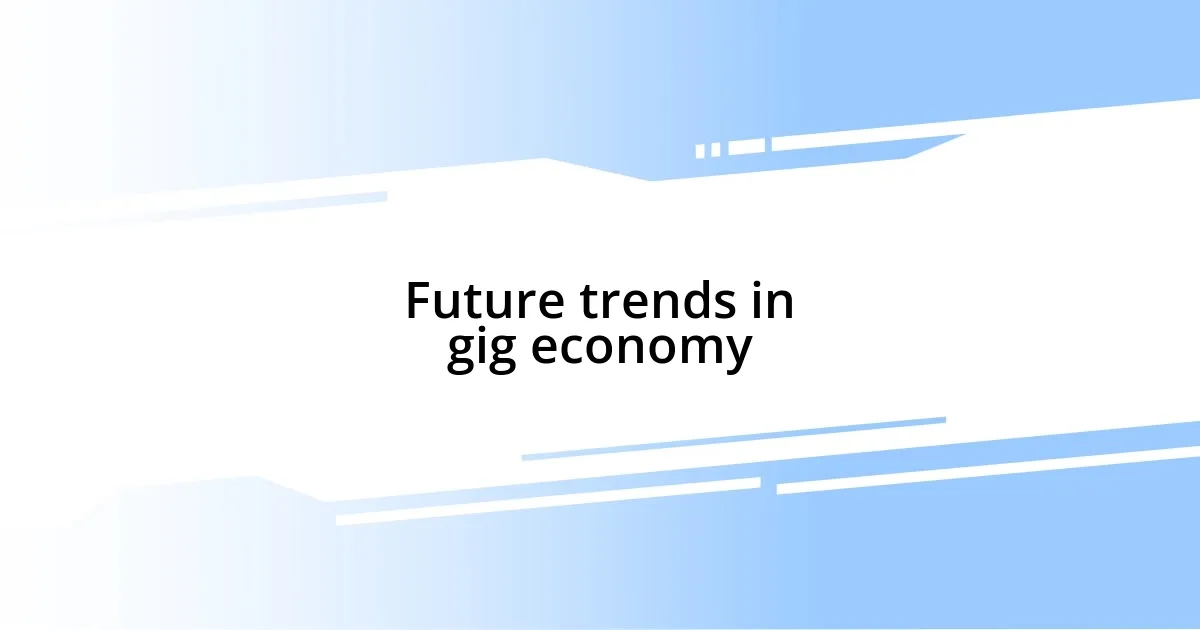
Future trends in gig economy
As I look ahead, one trend that stands out in the gig economy is the rise of specialized platforms. Instead of general purpose sites, I foresee more niche marketplaces emerging. These platforms cater to specific skills or industries, allowing gig workers to connect directly with clients who are searching for that exact expertise. It excites me to think about the possibilities; wouldn’t it be refreshing to skip the noise and find work that truly resonates with our individual talents?
Another trend I’ve noticed is an increasing demand for hybrid work models. More companies are choosing to mix traditional employment with gig roles, which offers workers a hybrid approach to job security and flexibility. Personally, I believe this could streamline collaboration. Imagine being part of a team where some members are dedicated full-time employees while others contribute as freelancers—they bring diversity and fresh ideas, enriching the workplace culture. Doesn’t that sound like the best of both worlds?
Finally, technology will undoubtedly play a critical role in shaping the gig landscape. Advancements in AI and machine learning are making it easier for gig workers to market themselves and for clients to find the perfect match. I can’t help but feel that tools driven by these technologies might not only simplify tasks but also enhance our ability to showcase our skills creatively. With the evolution of these tools, it’s almost like we’re being empowered to become our own brand managers. How exciting is it to think about taking control of our narratives in the gig economy?
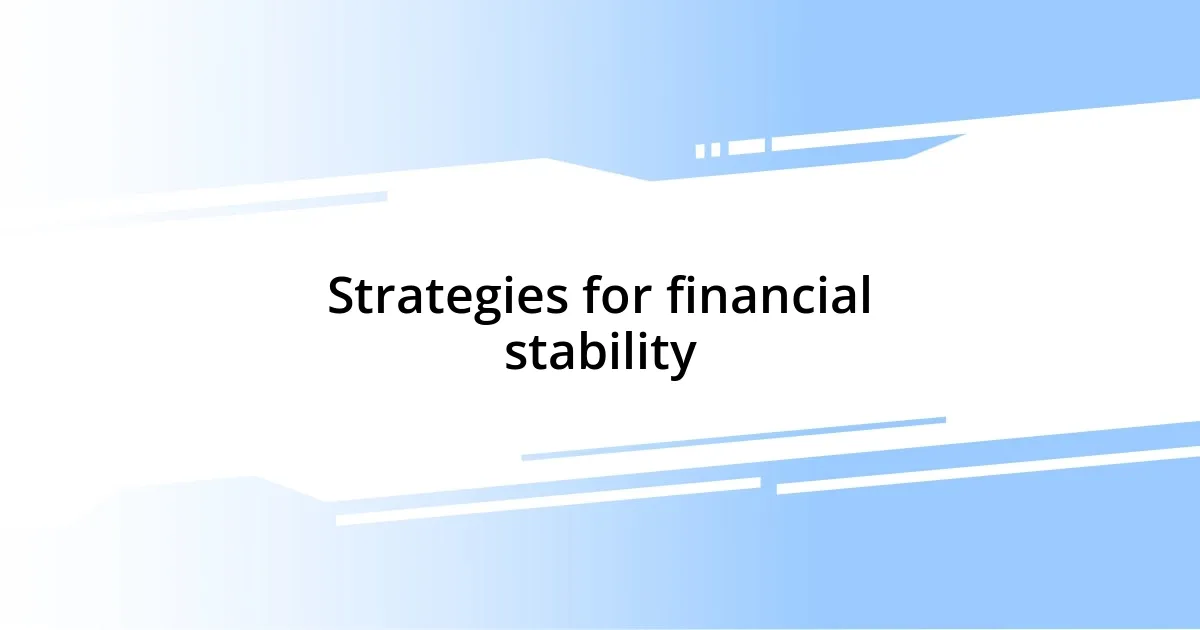
Strategies for financial stability
One effective strategy for achieving financial stability in the gig economy is building a diverse income stream. I remember when I started taking on side projects in addition to my main gig, which not only eased financial pressure but also opened up new networking opportunities. How many times have you felt underwhelmed by a single source of income? Creating multiple revenue channels can provide a safety net and buffer against those slow months.
Setting aside a dedicated emergency fund is another critical tactic I cannot emphasize enough. I learned this the hard way during a particularly busy summer when I pushed my savings to the background, only to face unexpected car repairs later. I’d recommend aiming to save at least three to six months’ worth of living expenses. Have you considered how secure you’d feel if you had that cushion? It can turn a stressful situation into just a minor hiccup.
Lastly, investing in professional development can enhance your earning potential in the long run. I’d suggest regularly enrolling in courses or workshops to sharpen existing skills or learn new ones. Personally, I didn’t realize how much a certification could elevate my freelance rates until I finally bit the bullet and enrolled in an online course. Isn’t it fascinating how knowledge truly becomes an asset? Making this small investment in yourself can pay dividends not just financially, but also in terms of confidence and career satisfaction.





